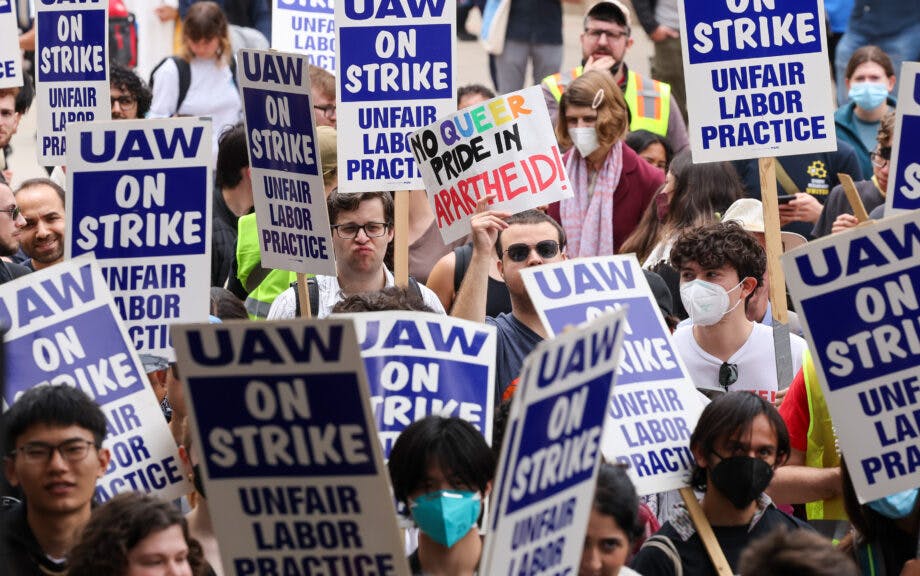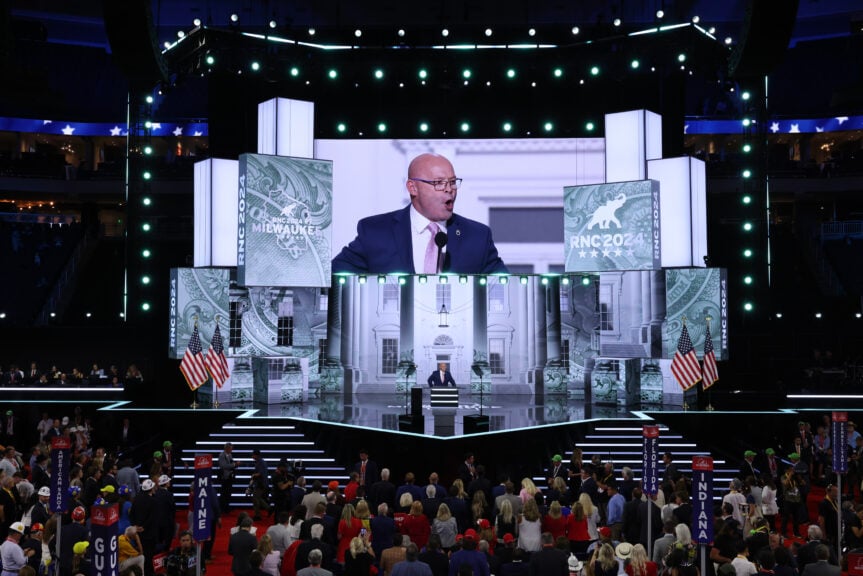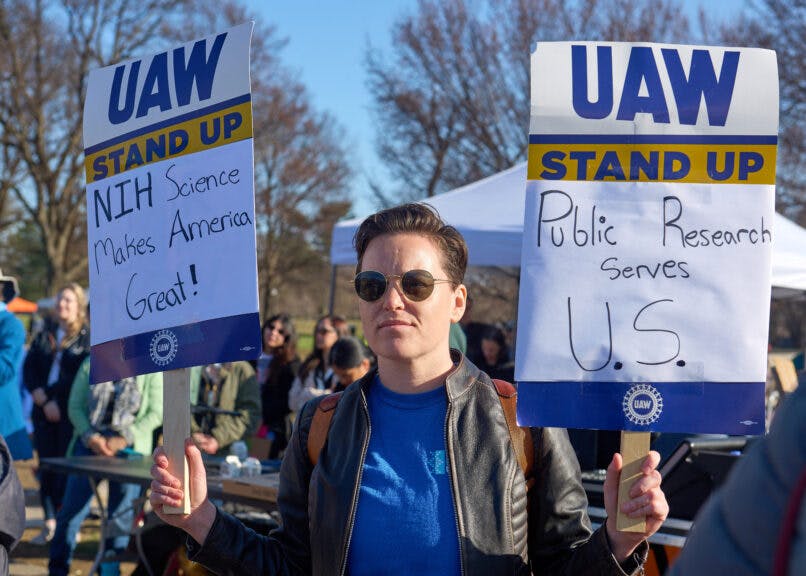


In an action that likely wasn’t on many Americans’ bingo cards for the first six months of a Republican presidency, the Trump administration has exempted major labor unions from transparency measures used by regulators to find fraud, and by critics to show well-paid union bosses’ hypocrisy and partisanship.
The action was one of several surprising giveaways by the Trump administration and its Department of Labor to union bosses in its first 200 days, a Daily Wire review found. In May, Trump pardoned James Callahan, the former president of the International Union of Operating Engineers, who was facing prison for secretly taking $315,000 in “gifts” from a company the union paid. Under Callahan, the union endorsed Joe Biden over Trump. (Trump’s Pardon Attorney Ed Martin did not respond to a Daily Wire inquiry on the rationale.)
So-called LM-2 disclosures filed with the Department of Labor show that Callahan was paid more than $500,000 a year as union president, even as unions position themselves as the cure for outsized gaps between CEO and worker pay. Those same forms enabled Callahan’s prosecution: He broke the law by not publicly disclosing the gifts, which would have alerted his fellow union members that he kept them for himself rather than sharing them with the organization.
On July 1, the Office of Labor-Management Standards proposed a rule change that would decrease the number of unions required to file such detailed public reports. Unions with more than $250,000 in annual revenue are currently required to file an LM-2, but the cutoff would be raised to $450,000. That means nearly 900 unions would only have to file a less-detailed form called the LM-3. The threshold for LM-3s was also lowered, allowing more unions to file only a bare-bones LM-4.
The moves come even as government employee unions have been the primary thorn in the administration’s side, responsible for many of the lawsuits leading to injunctions, and for the rules that make it difficult to fire federal workers.
Some Trump administration officials and Republicans like Missouri Senator Josh Hawley have sought to win over labor unions to build an enduring electoral coalition, noting that the majority of rank-and-file members of some blue-collar unions voted for Trump in 2024. One key White House staffer has gone further, advocating “sectoral bargaining” that would require every business in a particular industry to be unionized.
Others say that unions are unlikely ever to put their organizational heft behind Republicans, and that trading favors to gain formal endorsements would put the party in the same compromised position as Democrats, who disastrously shut down schools during the coronavirus pandemic at the behest of union bosses.
Proposed rules are subject to a public comment period, which ended July 31. Few rules have been met with such uniformly negative feedback. Of the nearly 300 comments from individuals, only one supported the change, a Daily Wire review found.
“Seems very shady,” one wrote. “I’d appreciate it if you didn’t allow Union bosses to hide money. That doesn’t seem to be in keeping with the transparency that I voted for,” another said. A third simply submitted a graphic of Kamala Harris being showered in union cash. “As a non-union employer, I’ve used these reports to show my employees how union dues are actually spent,” a fourth said.
The Institute for the American Worker noted that union members who had funds embezzled by their leaders in recent years would now have less insight into how their dues were being spent. For example, in 2024, the Secretary-Treasurer of the International Association of Machinists and Aerospace Workers Local Lodge 2198 pleaded guilty to embezzling more than $63,000; under the proposed rule, the group would no longer have to file an LM-2.
Support for the proposal came only from some of the Trump administration’s most committed enemies. The American Federation of State, County, and Municipal Employees praised the change and demanded even less transparency, asking for “specific employee names and titles, and specific vendor and payee names, [to be] redacted,” as well as “increas[ing] the threshold for Form LM-2 beyond the current proposed level.”
The National Education Association, whose members voted last month to have the group participate “in the mass democratic movement against Trump’s authoritarianism,” applauded the proposal, while also asking it to go further and not require unions to report payments of less than $5,000.
The proposed rule says its goal is to “reduce unnecessary reporting burdens on labor organizations” and keep pace with inflation, noting that when the thresholds were established in 2003, $250,000 was worth $430,000 in today’s dollars.
“This deregulatory action was part of a historic effort to cut red tape at the Department of Labor and reduce government-imposed burdens,” a White House spokeswoman said.
But comments on the rulemaking docket said advances in specialized accounting software since 2003 meant that even detailed forms are now trivial to fill out. “If a union diligently maintains its books, as dues payers should expect, detailed filing should not be any burden,” one said. “If anything, smaller organizations should be required to itemize spending in the same manner as the largest.”

United Auto Workers Local 4811 members working in academia strike at UCLA. (Brian van der Brug / Los Angeles Times via Getty Images)
White House official backs industry-wide collective bargaining.
Trump’s Labor Secretary is Lori Chavez-DeRemer, a former centrist Republican congresswoman from Oregon who supported the Protecting the Right to Organize (PRO) Act, which was reviled by traditional conservatives. She backtracked on that position during her confirmation hearing, but the Teamsters supported her nomination.
A pro-organized labor strain extends into some parts of the White House itself. A former JD Vance staffer named Wells King is now a White House aide focused on labor issues in the powerful Domestic Policy Council. King not only wants to protect the right of employees of a company to unionize, but wants to expand it to industry-wide unions covering all workers in a sector, regardless of whether they want it.
“Ideally the labor movement would shape the economy … Ideally we would do this on essentially the sector level, what’s called sectoral bargaining, which is a proposal that’s popular on the Left,” he said on a podcast.
In an essay, King wrote that “American policymakers interested in pursuing genuine reform should begin by looking to countries in Europe.” In America, “workers are organized worksite by worksite into independent ‘bargaining units’ that may then bargain collectively with their respective employers if a majority vote to unionize,” he wrote.
It would be better, he continued, if “instead of privately negotiated arrangements brokered between firms and workers’ representatives, most American workers are covered by one-size-fits-all employment standards … Some reformers and labor leaders are considering the potential for collective bargaining at the sectoral, regional, and even national level — so-called ‘broad-based bargaining.'”
Sector-wide collective bargaining would result in more members being in unions than if a majority of a company’s employees had to consent, which would be a good thing because union employees have better working conditions and better quality of life, he wrote. In USA Today, King wrote that if every company were unionized, “contracts could cover many more workers and be more generous without putting any particular employer at a disadvantage.”
The Committee to Unleash Prosperity said in June that King was involved with selecting nominees to the National Labor Relations Board, and that “White House insiders are telling us [King] may recommend himself to serve on the board or even serve as chairman.” The conservative group said Sen. Rand Paul (R-KY) would oppose King’s nomination if it were to occur, likely making such a nomination dead on arrival. On July 17, the administration nominated two Republicans — neither of whom was King — for the board. A third position will open up in August.
White House Assistant Press Secretary Taylor Rogers told The Daily Wire that King is not in control of any personnel decisions.
“Wells King is a policy aide who covers labor policy among other issues in his portfolio,” Rogers said. “Personnel decisions are managed by [the Presidential Personnel Office], not the policy councils.”

Teamsters President Sean O’Brien (Photo by Chip Somodevilla/Getty Images)
Not your father’s labor union.
The Republican reckoning with organized labor is unsurprising, given the economic realignment of America’s political parties. Democrats now represent the very rich and very poor, while Republicans dominate the working class. President Trump’s America First economic policies, such as tariffs, are designed to revitalize the American manufacturing base that was historically represented by unions.
At the same time, the Democrat Party’s demonization of whites and males has repelled blue-collar workers. One pro-Kamala Harris ad aimed at persuading the demographic featured effeminate actors awkwardly pretending to be blue-collar, with one sitting on a pickup truck with his legs crossed.
It’s an open secret that even as union bosses form a key part of the Democrat machine, many rank-and-file workers they supposedly represent vote for Republicans. An internal poll by the Teamsters found that 60% of members wanted the union to endorse Trump, while only 34% wanted to endorse Harris. Still, union bosses refused to endorse Trump, instead endorsing no one.
Critics said the divide between union bosses and rank-and-file is a wedge that benefits Republicans, highlighting that they don’t achieve their stated aim of representation. The fact that so many blue-collar union members cast votes for Trump when virtually all union heads backed President Joe Biden and Harris shows that when it comes to winning an election, it matters little who the union bosses formally support, they said. (Unions can provide money to campaigns, but that seems to have less influence on elections than it did in a world where most people were reached through expensive TV commercials.)
Patrick Semmens of National Right to Work, which opposes forced unionization, believes any Republican attempt to win elections by relying on union bosses is a fool’s errand.
“One might think, ‘We’re winning here, let’s keep attracting [working-class voters] by supporting illegal immigration laws and not trying to eliminate fossil fuels.’ Other people for some reason say, ‘That’s been working but let’s not do that, let’s try to get the top union officials on our side.”
“The idea that there’s some deal to be cut with union officials is very misguided. It speaks to the fundamental flaw in reasoning that we see, mostly from Democrats, that says ‘We want to be pro-worker. Who represents workers? Union bosses.’ But they don’t really represent them, they have a monopoly over them,” Semmens told The Daily Wire. “It’s bad policy and bad politics.”
Reducing LM-2 disclosures could conceal how at-odds union bosses are with the working class. Some unions that will no longer have to file detailed disclosures sent money to groups like ActBlue, Black Lives Matter, and the Democratic National Committee. Without the disclosures, members might not know that’s how their money is being spent.
“LM-2s show the salaries, how many officers have the same last name. This is the only way an employee can know if someone who’s advocating for a union in their workplace is on the payroll of the union,” Semmens said.
While the votes of blue-collar workers can swing an election, organized labor itself is no longer the massive pot of votes that it once was. Private-sector union membership has declined precipitously over the years. Unions have instead become more characteristic of government employment; half of union members in the United States now work for the government.
Semmens said even if some labor groups like the Teamsters consist of mainly Republican members, “solidarity” means they can’t cross their government employee union brethren, for whom protecting jobs means boosting government spending. “The idea that there would be a separation between the blue-collar and government unions, there is no such distinction,” he said.
A 2024 Bureau of Labor Statistics report said “the highest unionization rates were among workers in education, training, and library occupations.” Americans in those fields are unlikely to throw their weight behind a President JD Vance. In 2022, the American Library Association elected as its president a self-proclaimed Marxist lesbian who believes that “defending libraries is fighting capitalism.”
As unions have hemorrhaged blue-collar workers, labor bosses have resorted to keeping the dues money flowing by unionizing new white-collar groups, and drifted further left to appease them. The United Auto Workers has unionized graduate students and adjunct professors on college campuses, which now make up more than a quarter of the union’s membership. The Biden administration also let UAW organize National Institutes of Health workers, brushing aside legal concerns as Biden courted the union’s endorsement.

Photo by Dominic Gwinn / Middle East Images via AFP)
Far-left knowledge workers who have never worked in a factory now wear the carcass of an automobile group as a skin-suit. The UAW Higher Education Department’s priorities and primary issues are, taken directly from its website:
We oppose cuts to NIH funding, as well as other essential sources of government funding, and we have sued the Trump administration to reverse cuts to NIH funding.
We oppose threatening deportation for international workers who participate in Palestine solidarity demonstrations.
We oppose cuts to socal security, Medicaid, medicare, and the Department of Education.
We oppose targeting workers and universities for their work on DEI-related issues
We oppose HR 28 and the Trump administration’s regression in Title IX protections.
That means that while the Trump administration pursues action against universities for antisemitism and DEI, a blue-collar private-sector union is working for the opposite.
At the University of California-Berkeley, UAW repurposed the collective bargaining process from one focused on worker safety on the assembly line to one demanding that the school cut ties with Israeli companies. A union committee made a list of “members of UC Berkeley’s Board of Regents who were Jewish or had any connection to Israel,” one of whose homes was subsequently vandalized. When a Jewish union member sued, the union asked a judge to bar the litigant from going public about officials’ activities.
Unions have historically pressured politicians to make changes to protect their power. After the Waterfront Commission of New York Harbor determined that nearly 20% of the hires proposed by unions there were connected to the Mafia, the International Longshoremen’s Association neutered the commission.
Having politicians owe favors to union bosses can put the country in a precarious position. Last year, the ILA threatened to shut down American ports, with significant economic implications, if its members didn’t get raises of 60% or more. “I will cripple you,” ILA boss Harold Daggett said, before Biden intervened to broker a deal.
The Teamsters did endorse a Republican for president in 1972, putting their weight behind Richard Nixon just after he commuted the prison sentence of corrupt union president Jimmy Hoffa.
But neither man’s story ended well.
